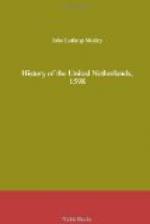On the 23rd April—three mortal weeks having thus been wasted in diplomatic trilling—Barneveld was admitted to his Majesty’s dressing-room. The Advocate at the king’s request came without his colleague, and was attended only by his son. No other persons were present in the chamber save Buzanval and Beringen. The king on this occasion confirmed what had so recently been stated by Villeroy. He had thoroughly pondered, he said, all the arguments used by the States to dissuade him from the negotiation, and had found them of much weight. The necessities of his kingdom, however, compelled him to accept a period of repose. He would not, however, in the slightest degree urge the States to join in the treaty. He desired their security, and would aid in maintaining it. What had most vexed him was that the Protestants with great injustice accused him of intending to make war upon them. But innumerable and amazing reports were flying abroad, both among his own subjects, the English, and the enemies’ spies, as to these secret conferences. He then said that he would tell the Duke of Bouillon to speak with Sir Robert Cecil concerning a subject which now for the first time he would mention privately to Olden-Barneveld.
The king then made a remarkable and unexpected suggestion. Alluding to the constitution of the Netherlands, he remarked that a popular government in such emergencies as those then existing was subject to more danger than monarchies were, and he asked the Advocate if he thought there was no disposition to elect a prince. Barneveld replied that the general inclination was rather for a good republic. The government, however, he said, was not of the people, but aristocratic, and the state was administered according to laws and charters by the principal inhabitants, whether nobles or magistrates of cities. Since the death of the late Prince of Orange, and the offer made to the King of France, and subsequently to the Queen of England, of the sovereignty, there had been no more talk on that subject, and to discuss again so delicate a matter might cause divisions and other difficulties in the State.
Henry then spoke of Prince Maurice, and asked whether, if he should be supported by the Queen of England and the King of France, it would not be possible to confer the sovereignty upon him.
Here certainly was an astounding question to be discharged like a pistol-shot full in the face of a republican minister.
The answer of the Advocate was sufficiently adroit if not excessively sincere.
If your Majesty, said he, together with her Majesty the queen, think the plan expedient, and are both willing on this footing to continue the war, to rescue all the Netherlands from the hands of the Spaniards and their adherents, and thus render the States eternally obliged to the sovereigns and kingdoms of France and England, my lords the States-General would probably be willing to accept this advice.




